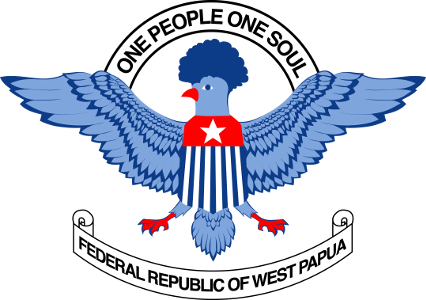
Book Launch: Clovis Mwamba’s ‘The Meteorite Memos’

Launch of Clovis Mwamba's book of poems and essays 'The Meteorite Memos' during the West Papua Open Day in Docklands on 26 November 2023. Clovis, a teacher, activist, and politician in the Democratic Republic of Congo, wrote the poems on flattened cigarette packets while he was a political prisoner in a secret military camp in Kinshasa in 1998-1999. The Meteorite Memos opens an archive of atrocity and is therefore a human rights document; but also points to a profoundly influential African initiate knowledge system. The post also includes video-excerpts of a Cabaret Burlesque 'West Papua & The Congo' performed to highlight the forces that create war and genocide in West Papua and The Congo. These two nations share the roots of most decolonizing struggles, but are also bound by the catastrophic effect of UN Secretary-General Dag Hammarksjöld's death in the Congo on the unholy and illegal denial of West Papua's registration as a UN Non-Self-Governing Territory in 1961.
WP Open Day, 11 Dec 2022, Paul Stewart’s ‘All the Rage’

Photos, slides, videos, speeches and documents associated with the launch of Paul Stewart's book 'All the Rage' (Melbourne Books, 2022) at the West Papua Open Day in Docklands (Victoria) on 11 December 2022. Includes Paul's interview with publisher David Tenenbaum, and Jacob Rumbiak talking about Australia and America's unprecedented criticisms of Indonesia in West Papua on 9 November 2022 in the United Nations. Also links to historical media articles and other relevant documents.
Pig, symbol of justice and peace in West Papua
An engaging photograph, a short story, and two fascinating ABC-Radio interviews about the importance of pigs in the religious and social life of the highlanders of West Papua.
West Papua’s return to the UN: fulfilling Hammarskjöld’s legacy

This memorial for Dag Hammarskjöld and his 1961 Decolonisation Program for West Papua explores a complex global story of two UN peace-keeping undertakings in 1961 organised by the UN Secretary-General. The first inserted a UN peace-keeping military force into the Democratic Republic of Congo to de-escalate conflict over the new state’s mineral resources. The second was designed to deliver the West Papuans their right of self-determination and to prevent Indonesia from invading and taking over the Non-Self-Governing Territory. What was the outcome? First, the Secretary-General lost his life. Second, the new state of Congo nose-dived from a new democracy to a long-standing authoritarian state. Third, the Non-Self-Governing Territory of Dutch New Guinea (West Papua) was passed to Indonesia, an Asian state on the verge of political and economic collapse.
Dutch guerilla’s memoir of WWII in Netherlands (West) Nieuw Guinea
'We fought in the Jungle: my guerrilla struggle in New Guinea in the Second World War' is the English translation of em>Vij Vochten in het bos a WWII memoir by Sergeant Maurits Christiaan Kokkelink, which was published in Amsterdam in 1956 but never reprinted, and was found in a second-hand bookstore in Ljouwert, capital of the far northern province of Friesland.
West Papua increases its legal arsenal with publication of ‘State responsibility in international law’

This legal paper affirms that States have a responsibility to protect all those within their territory; that third States have a right and obligation to complain of wrongful acts committed by a sovereign State; and finally, that sovereignty comes under question where a people within a sovereign state are subject to alien subjugation or serious violations of their human rights. The 24,000 word paper (100 x A5 pages) is downloadable (below) and can be quoted providing the usual creditations are incorporated.
Federal Republic of West Papua publishes important new book

This book traces the shift in international law during the twentieth century from states' rights to people's rights, and how the norms of jus cogens (rules that cannot be derogated from) have broadened to include self-determination, genocide, slavery, torture, murder and the disappearance of individuals. It brings together all the UN resolutions, and principles, and rules that have been applied, or ignored, in the case of West Papua’s occupation, and analyses the relationship between occupied West Papua and international law. The booklet (160 x A5 pages) is downloadable (below) and can be quoted from providing the usual creditations are incorporated.
3rd Papuan National Congress, Declaration

On 19 October, Prokorus [normally spelt Forkorus] Yaboisembut was elected President
of West Papua, and the evangelist Edison G. Waromi was elected Prime Minister.
Following the elections, Prokorus Yaboisembut read out the Declaration of a new
state—the Federal State of West Papua, the symbol of the state—the Mambruk Bird, the
currency—the guilder, the national anthem—Hai Tanahku Papua, the national
languages—Pidgin, Indonesian Malay, Papuan languages, and English, and the
geographic territory.
The Declaration stated: “On this day, 19 October 2011, we proclaim the full
independence and sovereignty of our state, and therefore the State of Indonesia must
speedily end its occupation of Papua. All components of the leadership elected at the
Third Papuan People's Congress shall immediately discuss the basic principles of the
State of West Papua”.
West Papua’s Right to Self-Determination
In this five-thousand word paper for the 2001 Festival of Ideas in Adelaide, Jacob Rumbiak examines three international agreements and three Indonesian regulations, via which over-rode Dutch-funded self-determination policies and projects, and the West Papuans right to be consulted, and independence, were consciously ignored.
Reflections from behind the Iron Bars of Indonesia
A moral appeal on behalf of the Jayapura Five, first published in West Papua Media.

